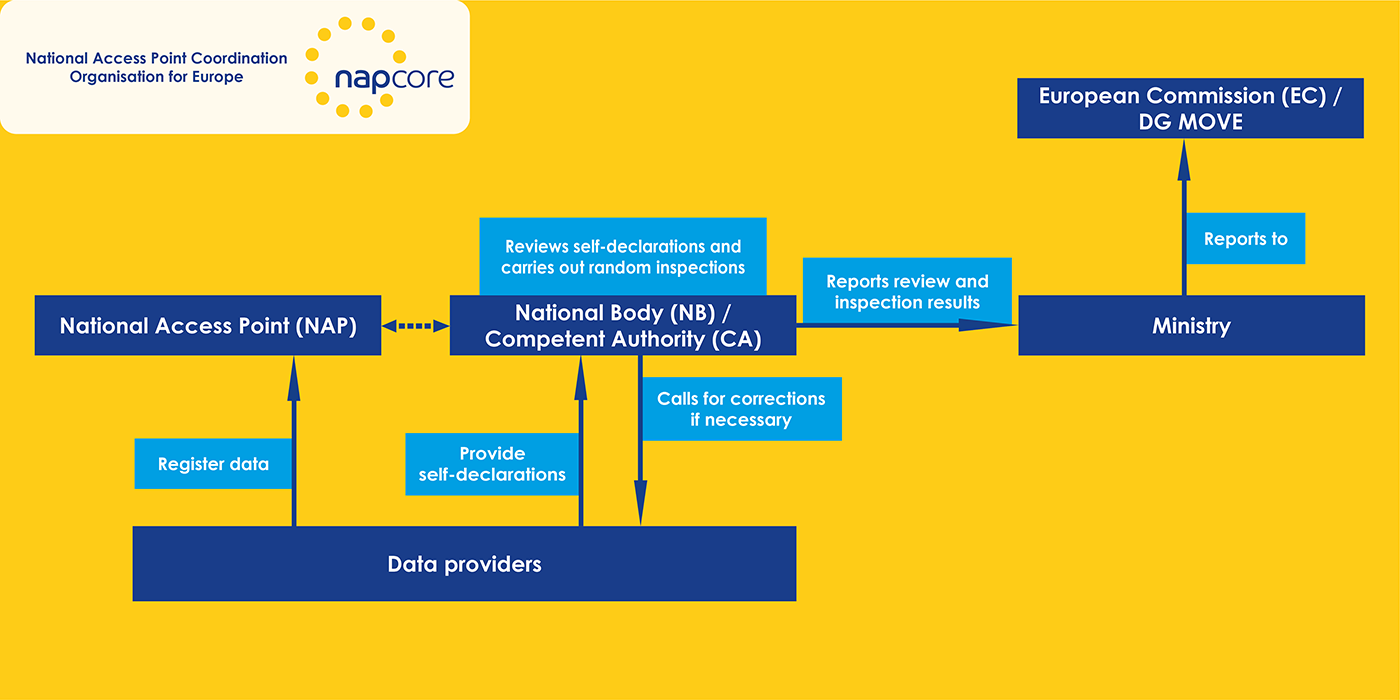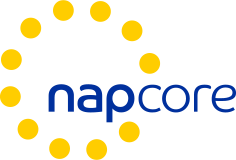
National Bodies
What is a National Body/Competent Authority?
A National Body (NB)/Competent Authority typically refers to an organisation, institution, or entity that operates at a national level.
These bodies are established by the government or recognized by authorities to oversee, manage, regulate, or represent various aspects of national affairs. They have to be impartial and independent.
In the legal framework of the ITS Directive 2010/40/EU and related Delegated Regulations (EU) the main task of a National Body/Competent Authority is to assess the quality of mobility data and services (compliance assessment). Two Delegated Regulations mention that a National Body has to be appointed, namely Delegated Regulation (EU) No 886/2013 and (EU) No 885/2013. The other two relevant Delegated Regulations (EU) 2015/962 and (EU) 2017/1926 mention that Competent Authorities of the Member States shall carry out the compliance assessment.

What are the respective Delegated Regulations about?
| Priority Action a of the ITS Directive 2010/40/EU | Priority Action b of the ITS Directive 2010/40/EU |
| • Commission Delegated Regulation (EU) 2017/1926 | • Commission Delegated Regulation (EU) 2015/962 • Commission Delegated Regulation (EU) 2022/670 |
| • Abbreviation: MMTIS | • Abbreviation: RTTI |
| the provision of EU-wide multimodal travel information services | the provision of EU-wide real-time traffic information services |
| Priority Action c of the ITS Directive 2010/40/EU | Priority Action e of the ITS Directive 2010/40/EU |
| • Commission Delegated Regulation (EU) No 886/2013 | • Commission Delegated Regulation (EU) No 885/2013 |
| • Abbreviation: SRTI | • Abbreviation: SSTP |
| the provision of road safety related minimum universal traffic information free of charge to users | the provision of information services for safe and secure parking places for trucks and commercial vehicles |
Who will be assessed by the National Bodies/Competent Authorities?
Providers of data and services must submit a dataset or a description of their data (metadata) to a National Access Point (NAP) in accordance with the aforementioned Delegated Regulations. The provision of (meta)data shall be accompanied by a ‘declaration of compliance’ and ‘accompanying documentation’. The National Body or the Competent Authority can assess if data/service providers meet the requirements of the Delegated Regulations.
What is compliance assessment?
The National Bodies or Competent Authorities of the Member States carry out compliance assessments to check if data and service providers are compliant with the requirements of the Delegated Regulations (EU) 2017/1926, 2015/962, No 886/2013 and No 885/2013. In some Member States a financial penalty can be imposed to data/service providers by the National Body/Competent Authority if data quality is not up to date. The requirements of each Delegated Regulation are listed in the compliance assessment forms set up in NAPCORE (see table below).
What is a declaration of compliance also called self-declaration (SD-form)?
Declarations of compliance – also called self-declarations – have to be filled-in and signed by data/service providers that have data sets or services listed in the data categories of the Delegated Regulations and provide them on the National Access Point. The data/service providers declare compliance with the Delegated Regulations by signing the self-declaration. For each data/service provider affected by a Delegated Regulation one signed self-declaration is necessary per Delegated Regulation. For the Delegated Regulations (EU) 2015/962 and 2017/1926 more than one template is available because different roles are affected differently by the requirements of the Delegated Regulation.
The National Body/Competent Authority will use these self-declarations as input in their assessment process (compliance assessment) to check if the quality of the dataset or service described is up to date and is compliant with the requirements of the Delegated Regulations.
In NAPCORE templates for self-declarations were drafted and approved by the Steering Committee. The templates are linked in the table below.
What is accompanying documentation (AD-form)?
Accompanying documentation shall be provided by the data/service provider that provides (meta)data in accordance with the respective Delegated Regulations on the NAP. The information in the accompanying documentation shall support the National Body/Competent Authority in carrying out the compliance assessment. If existing organisational documents provide answers or information to requested topics, they shall be added to the Annex of the accompanying documentation. Per Delegated Regulation one template for the accompanying documentation was prepared within NAPCORE. The templates are linked in the table below.
What are compliance assessment forms (CA-form)?
Compliance assessment forms shall be used by the National Body/Competent Authority as basis to carry out compliance assessment. The compliance assessment forms include the key question per article of the Delegated Regulation, the theoretical and the content assessment as well as the requirements to check the compliance.
Within NAPCORE compliance assessment processes for the Delegated Regulations (EU) 2017/1926, 2015/962, No 886/2013 and No 885/2013 will be harmonised. This shall lead to a common assessment across Europe and allow for comparability of the assessment of international private organisations.
The necessary processes, required forms as well as quality and evaluation criteria will be discussed and harmonised in NAPCORE, where appropriate. Common strategies to address private organisations and ITS-related platforms to deliver data on the NAPs fully compliant to the Delegated Regulations will be worked out.
All mentioned templates are listed in the following table:
| SD-form | AD-form | CA-form | |
| 885/2013 SSTP | |||
| 886/2013 SRTI | |||
| 2015/962 RTTI | Please use the template for the role your company fulfils: • service provider • digital map producer • road authority and road operator | ||
| 2017/1926 MMTIS | Please use the template for the role your company fulfils: • travel information service provider • transport authority, transport operator, infrastructure manager or transport on demand service provider |







